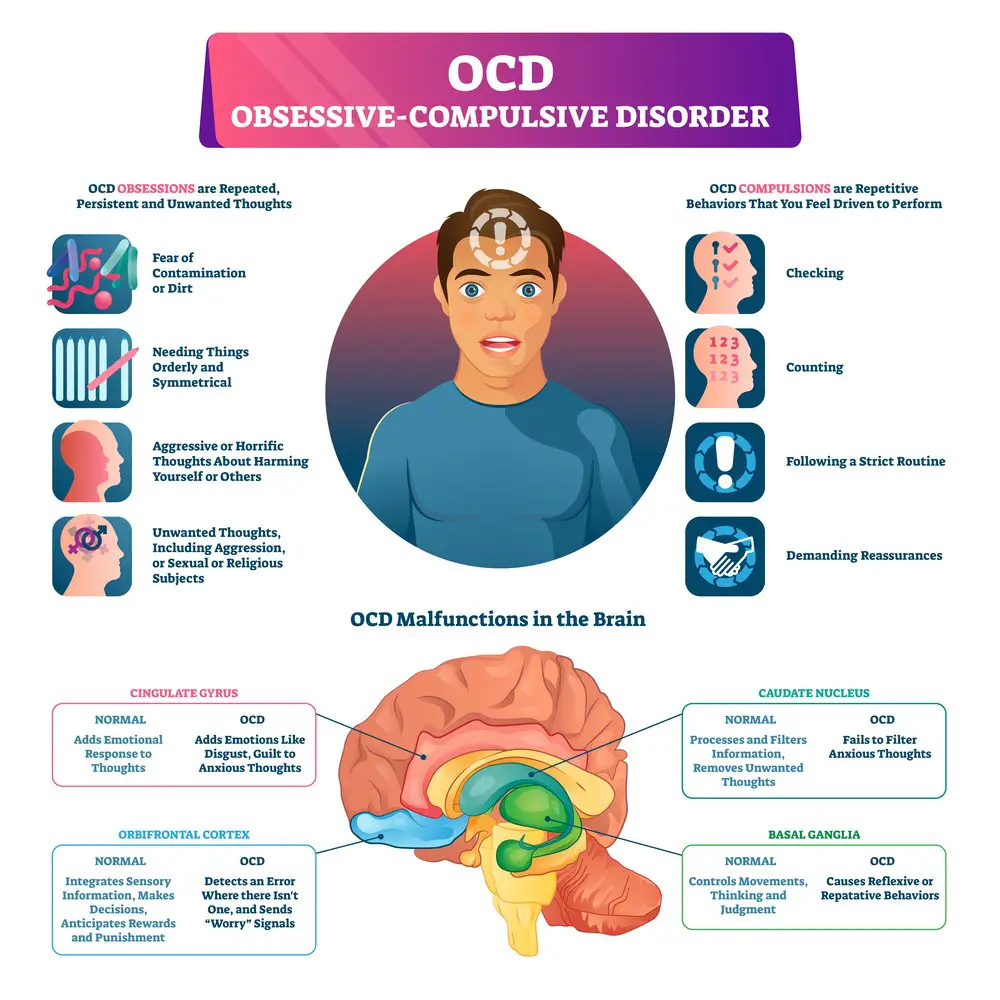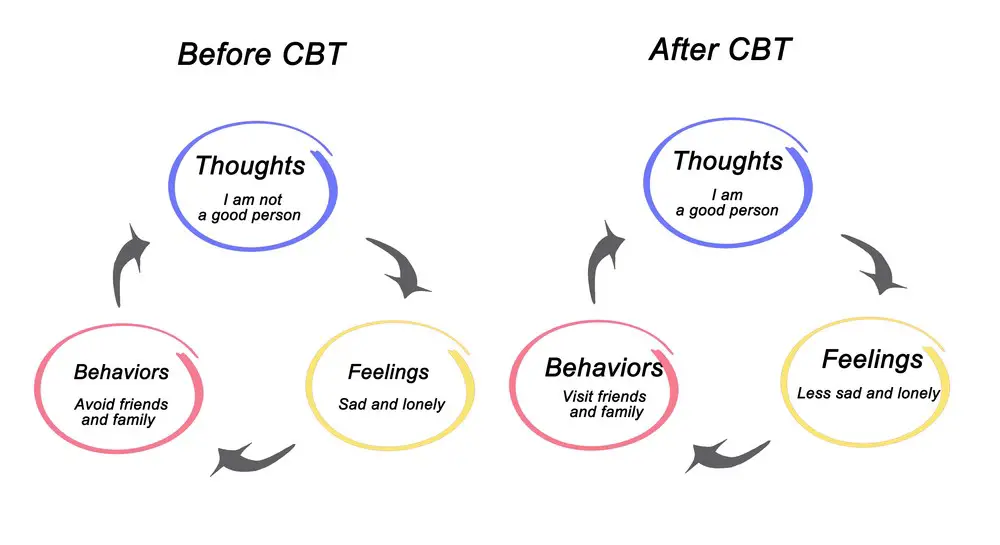As a BetterHelp affiliate, we receive compensation from BetterHelp if you purchase products or services through the links provided
Living with Obsessive Compulsive Disorder (OCD) can be a challenging and isolating experience. As with many mental health conditions, it may feel like you’re alone in your struggles. However, numerous books have been written about OCD, providing valuable insight, advice, and support to those affected by it.
These books cover various topics, including understanding the disorder, coping mechanisms, personal recovery, and clinical perspectives. Additionally, some novels depict characters living with OCD, offering readers the chance to see and empathize with experiences different from their own. By exploring these resources, you can deepen your understanding of what it means to live with OCD and find practical strategies to help manage your symptoms.
Key Takeaways
- Books about OCD offer support, understanding, and resources to those affected.
- Various perspectives and topics are covered, from personal recovery to literary depictions.
- Exploring these books can help those with OCD feel less isolated and provide useful strategies.
 Understanding OCD
Understanding OCD
Obsessive-compulsive disorder (OCD) is a mental illness that affects millions of people worldwide. It’s often referred to as the “hidden epidemic” because many people who struggle with it don’t even realize they have it. The disorder is characterized by obsessions, compulsions, and intrusive thoughts, making it a challenging condition to live with and treat.
Obsessions are persistent and unwanted thoughts, images, or urges that cause anxiety or discomfort. Some common obsessions include fear of germs, excessive doubts, or concerns about harm to oneself or others. These thoughts can be incredibly distressing and make it difficult to focus on anything else.
Compulsions, on the other hand, are repetitive behaviors or mental acts that a person feels driven to perform in response to an obsession. Examples of compulsions could be excessive hand washing, repeatedly checking locks or appliances, or counting objects. These actions are often performed in an attempt to alleviate the anxiety caused by the obsession but usually only provide temporary relief.
While everyone might occasionally have an intrusive thought or engage in compulsive behavior, those with OCD experience these symptoms to a degree where they consume a significant amount of time and interfere with daily life.
To better understand and manage your OCD, you may find the following books helpful:
- Obsessive-Compulsive Disorder Demystified: An Essential Guide for Understanding and Living with OCD by Cheryl Carmin
- Your Guide to Breaking Free from Obsessive-Compulsive Disorder by Bruce Hyman and Cherry Pedrick
- Obsessive-Compulsive Disorder For Dummies by Charles H. Elliott, PhD and Laura L. Smith, PhD
- Stop Obsessing!: How to Overcome Your Obsessions and Compulsions by Edna B. Foa, PhD and Reid Wilson, PhD
- Freedom From Obsessive-Compulsive Disorder: A Personalized Recovery Program for Living with Uncertainty by Jonathan Grayson, PhD
By educating yourself about the nature of OCD, recognizing your triggers, and learning strategies to overcome the symptoms, you can start taking steps toward a more manageable and fulfilling life. Remember, you’re not alone in your struggle with OCD – support groups, therapists, and others who have experienced the condition can provide valuable guidance and perspective as you work to regain control over your thoughts and actions.
 Coping Mechanisms
Coping Mechanisms
Cognitive Behavioral Therapy
Cognitive Behavioral Therapy (CBT) is a proven and popular method for managing OCD symptoms. It helps you understand and control your anxiety. CBT focuses on identifying negative thought patterns and replacing them with healthier, more rational ones. A key component of CBT for OCD is Exposure and Response Prevention (ERP). This technique involves gradually exposing you to your feared situations or obsessions so you can learn to resist the urge to engage in compulsive behaviors.
Some CBT-based self-help books to explore:
- The Mindfulness Workbook for OCD by Jon Hershfield and Tom Corboy
- Getting Over OCD by Jonathan Abramowitz
Mindfulness and Acceptance Techniques
Another approach to managing OCD is through mindfulness and acceptance techniques, such as Acceptance and Commitment Therapy (ACT). This approach emphasizes learning to accept your thoughts and feelings rather than trying to control or suppress them. It helps you develop self-compassion and non-judgmental awareness, which can reduce obsessions’ power over you.
Recommended books for mindfulness and acceptance:
- The Mindfulness Workbook for OCD by Jon Hershfield and Tom Corboy (yes, it covers both CBT and mindfulness!)
- Overcoming Unwanted Intrusive Thoughts by Sally M. Winston and Martin N. Seif
Books as Tools
Self-help books can be a valuable resource in managing your OCD. They offer guidance, tools, and strategies that can be beneficial, especially if you are unable to access professional therapy. However, it’s important to remember that books are part of your mental health toolkit. It is recommended to use them in conjunction with other strategies and support systems, such as therapy, support groups, and self-care.
Some of the best books about OCD:
- Freedom from Obsessive-Compulsive Disorder by Jonathan Grayson
- The OCD Workbook by Bruce Hyman and Cherry Pedrick
- Break Free from OCD by Fiona Challacombe, Victoria Bream, and Paul Salkovskis
Remember, every individual’s journey with OCD is unique. The critical takeaway is to explore different techniques and resources, including the books mentioned, to find what works best for managing your OCD symptoms.
Personal Recovery
Finding hope and freedom from Obsessive Compulsive Disorder (OCD) often begins with discovering adequate resources to help guide your journey. One such valuable tool is the book “Freedom from Obsessive Compulsive Disorder: A Personalized Recovery Program for Living with Uncertainty” by Jonathan Grayson, PhD. This book is designed to provide a structured, personalized recovery program for individuals suffering from OCD.
What sets this book apart from other resources is its focus on developing a tailored approach to address your needs and symptoms. The author, Jonathan Grayson, offers guidance on creating an effective recovery plan, considering your unique experiences with OCD. This ensures you don’t feel overwhelmed by generic advice but instead gain clarity about the steps to take moving forward.
Some critical aspects of the book include:
- Expert advice on understanding the nature of OCD and how it impacts your daily life
- Techniques for managing obsessions and compulsions and reducing their negative impact on your well-being
- Tips for maintaining long-term progress and preventing relapses
Each chapter in the book offers a mix of real-life stories and practical advice, making it an engaging read that provides valuable insights and motivation for your journey. Along the way, you’ll find various strategies and tips to help you navigate the challenges of OCD.
A key takeaway from this book is that freedom from OCD is achievable when you have the proper guidance and support. By engaging with a personalized recovery program like the one in this book, you can learn how to regain control of your life, find hope, and embark on the path to freedom from OCD. Remember, recovery starts with taking that first step, and this book can serve as a helpful guide throughout your journey.
 Depictions in Literature
Depictions in Literature
Fiction and Romance
In fiction and romance, books like OCD Love Story by Corey Ann Haydu offer insight into individuals living with OCD. This book depicts the problematic intersection between OCD and romantic relationships by presenting the story of Bea and Beck. Their intricate relationship is a testament to how love can challenge and support people dealing with obsessions and compulsions.
Another notable title in this genre is John Green’s Turtles All the Way Down, in which the protagonist, Aza Holmes, struggles with OCD while trying to solve a mystery. This book showcases the internal turmoil that OCD can bring to one’s thoughts and emotions, alongside a John Green novel’s typical twists and turns.
Children and Young Adult Books
For younger readers, there is an excellent selection of novels that discuss OCD as well:
- Every Last Word by Tamara Ireland Stone: This book explores the life of Samantha McAllister, a high school student who hides her OCD from her friends but finds support in a new poetry group. It teaches the importance of embracing your true self and dealing with challenges.
- The Goldfish Boy by Lisa Thompson: Focusing on 12-year-old Matthew, who struggles with OCD, this story follows him as he unravels a neighborhood mystery from the safety of his window. It subtly conveys the challenges of OCD in children while offering an engaging and relatable tale.
- OCDaniel by Wesley King: This novel tells the story of Daniel, a young boy who discovers that he has OCD and learns new ways to cope with his compulsions. It is a great resource for understanding how OCD affects children’s lives and helping them navigate their journey.
- Finding Perfect by Elly Swartz: Suitable for middle-grade readers, this book follows 12-year-old Molly Nathans, who develops OCD as she deals with anxiety and the desire to be perfect. It helps young readers understand the complexities of anxiety and OCD amid family and school problems.
Remember, although these books shed light on OCD experiences, it is essential to acknowledge that no two stories or people are alike. With each of these books, you will gain insights into the lives of those affected by OCD, their relationships, and their challenges. Remember that it is essential to approach these stories with empathy, respect, and an understanding that everyone’s journey is unique.
Clinical Perspectives
Notable Professionals in the Field
When it comes to the treatment of obsessive-compulsive disorders (OCD), several professionals have made remarkable contributions to the field. Some noteworthy names include Edna B. Foa, PhD, Reid Wilson, PhD, Jonathan Grayson, PhD, Judith L. Rapoport, and Dr. Lee Baer. These experts have written extensively, offering insights and proven strategies for overcoming OCD. Many have also conducted groundbreaking research that has enhanced our understanding of the disorder.
Advanced Therapies
In recent years, new research has led to the development of advanced therapies for OCD. For example, the Association for Behavioral and Cognitive Therapies has introduced innovative methods to address various manifestations of the disorder. Key therapies and techniques include:
- Exposure and response prevention (ERP)
- Cognitive-behavioral therapy (CBT)
- Habit reversal training (HRT)
- Acceptance and commitment therapy (ACT)
These therapies have proven effective for addressing pure O, hoarding, trichotillomania, and compulsive checking behaviors, among other OCD-related issues.
 Different Manifestations
Different Manifestations
OCD can manifest in various ways, such as tormenting thoughts, secret rituals, and compulsive behaviors. To aid in understanding and treating these different manifestations, numerous books and resources are available:
- “Getting Well” by Reid Wilson, PhD focuses on overcoming obsessive-compulsive disorder with tailored strategies.
- “Tormenting Thoughts and Secret Rituals” by Ian Osborn, MD provides an in-depth look at the nature of OCD and its manifestations.
- “The OCD Workbook” by Bruce M. Hyman, PhD and Cherry Pedrick, RN offers a comprehensive guide to understanding and managing OCD symptoms.
- “Brain Lock” by Jeffrey M. Schwartz, MD emphasizes a four-step self-treatment method for overcoming OCD.
- “The Imp of the Mind” by Dr. Lee Baer explores the concept of intrusive thoughts and how they contribute to OCD.
- “Freedom from Obsessive Compulsive Disorder” by Jonathan Grayson, PhD serves as a guide to innovative approaches for treating OCD.
By familiarizing yourself with these resources and the professionals behind them, you gain a deeper understanding of OCD’s clinical perspectives and the advanced therapies that can help manage its various manifestations.
Frequently Asked Questions
What are some good books for understanding OCD?
- “The OCD Workbook” by Bruce M. Hyman and Cherlene Pedrick
- “Getting Over OCD” by Jonathan S. Abramowitz
- “The OCD Answer Book” by Patrick B. McGrath
- “Overcoming Obsessive Thoughts” by Christine Purdon and David A. Clark
These books provide a solid foundation for understanding the symptoms, causes, and treatments of OCD. They also include personal stories so you can relate to other people’s experiences.
Which books feature characters with OCD?
- “Turtles All the Way Down” by John Green
- “Every Last Word” by Tamara Ireland Stone
- “OCDaniel” by Wesley King
- “The Unlikely Hero of Room 13B” by Teresa Toten
These novels have characters living with OCD, which can provide a unique insight into their challenges and inspire empathy towards those with the condition.
What are the best self-help books for adults with OCD?
- “Brain Lock” by Jeffrey M. Schwartz
- “The Mindfulness Workbook for OCD” by Jon Hershfield and Tom Corboy
- “Breaking Free from OCD” by Jo Derisley, Isobel Heyman, and Cynthia Turner
These self-help books offer step-by-step guidance, proven strategies, and practical tools to help adults with OCD manage their symptoms and regain control of their lives.
Are there any helpful books for family members of someone with OCD?
- “Loving Someone with OCD” by Karen J. Landsman, Kathleen M. Russo, and Cherry Pedrick
- “When a Family Member Has OCD” by Jon Hershfield
These books offer valuable insights and advice on how to support a loved one with OCD while maintaining a healthy family dynamic.
Can you recommend books for therapists treating OCD?
- “Exposure and Response Prevention for OCD” by Jonathan S. Abramowitz
- “Cognitive Therapy for Obsessive-Compulsive Disorder” by Adrian Wells
These professional guidebooks can enhance therapists’ understanding of OCD and provide evidence-based treatment strategies to help clients with the disorder effectively.
What books can help parents of children with OCD?
- “Helping Your Child with OCD” by Lee Fitzgibbons and Cherry Pedrick
- “Talking Back to OCD” by John S. March
These books guide parents on how to support their child best, as well as techniques to help children manage their OCD symptoms and build resilience.
- 5 Helpful Ideas for Managing Stress During a Plumbing Emergency - April 24, 2025
- Buying a Franchise Without Losing Your Mind - April 24, 2025
- 3 Ways Wearing a Hat Can Help Lower Your Stress Levels - April 19, 2025
This site contains affiliate links to products. We will receive a commission for purchases made through these links.


 Understanding OCD
Understanding OCD Coping Mechanisms
Coping Mechanisms Depictions in Literature
Depictions in Literature Different Manifestations
Different Manifestations
